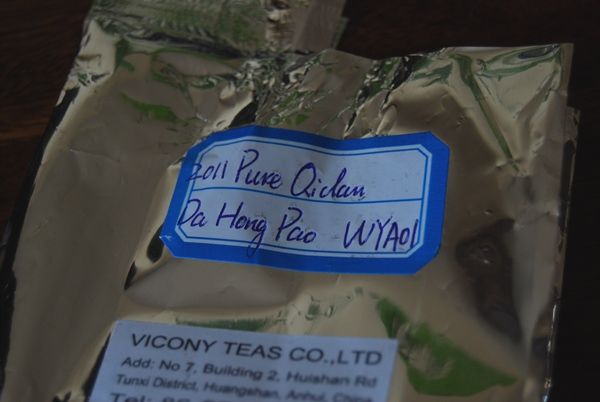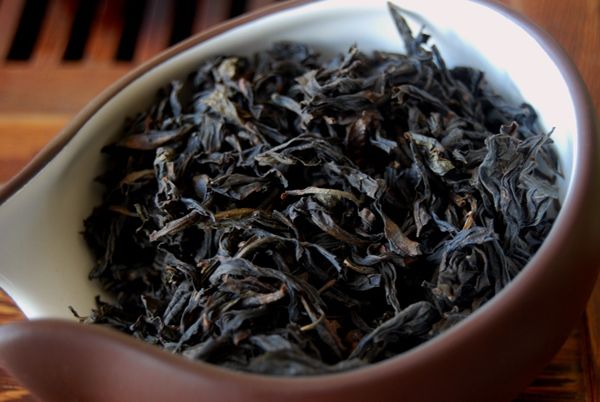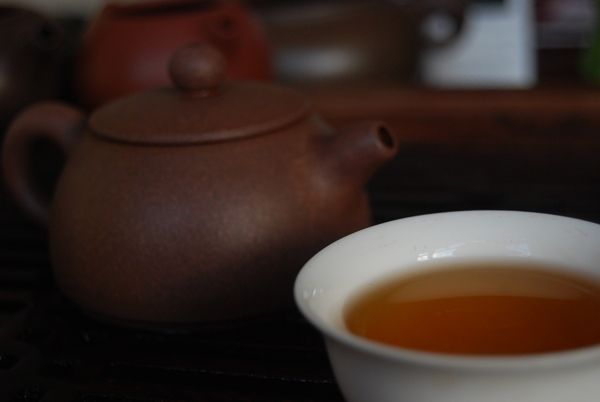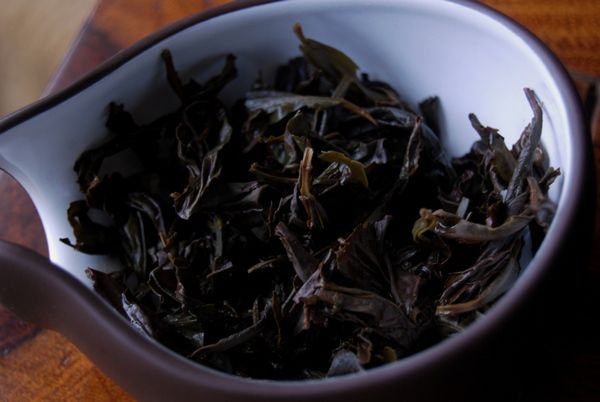Dahongpao is a funny thing. The six mother trees from which it has traditionally been made, growing in the Jiulongke region of Wuyishan, have, of course, been protected since 2007. A number of clones of these mother trees exist, which have become celebrated in their own right as the "next best thing", now that it is prohibited to pick leaves from the mothers. I recall visiting Postcard Teas in London, and being shown a spreadsheet by the owner, Timothy, detailing the quantity of leaf picked per year, and the corresponding price per kilo, for each of a set of first-generation clones.
Vicony Teas recently contacted me, with a generous offer of some yancha from their collection. One of two samples that they sent, this Dahongpao comes from the 15-year-old Qidan [ch'ee dan] clones growing in the Foguoyan [Buddha County] region, and which is part of the "zhengyan" [proper yancha] area.
Opening the sample bag releases an advanced, potent aroma of juicy yancha into the room. As shown above, the leaves are pretty, and long, and about the colour that one would expect for Dahongpao. I can't remember the last time that I had a good yancha, and so this is considered to be something of a treat for me.
Concordantly, I bring out my yancha pot from its slumber in the dark recesses of our teapot cupboard, which is shown below. She is so seldom used that she doesn't even have a name, which is unusual for my teaware (as the regular reader may have gathered). She was bought from Maliandao by my dear wife some years back, and is very well-suited to the sweet-yet-husky nature of yancha.
I find it very hard to overbrew yancha, and this affords the ability to pile tons of leaves into the pot, giving a thick, robust brew with plenty of character. The resulting soup is a heavy orange, as pictured above, which is particularly clean.
The aroma is something to behold: it is a shifting, dense mixture of lychee, butter, and many other complementary sweetnesses. It seemingly dwells for ever in the aroma cup. Likewise, the soup itself tastes remarkable: it is more of the same, but with a strong, numbing sensation on the lips and tip of the tongue that defies reason. It hangs in the throat for several minutes, and rewards slow, patient drinking, with full attention.
I have absolutely no idea as to the price of this tea, because Vicony Teas seems to operate a policy of "request the price list". It certainly is one of the most potent Dahongpao that I have encountered; however, the fearsome price of some of these popular yancha varieties can make the wallet quake in terror, and so I don't expect it to be inexpensive.
In small quantities, it is a treat to behold and well worth the session. Thanks again to Richard for the sample.
Addendum: This is priced at $380/kg, Vicony's most expensive product.
Addendum: This is priced at $380/kg, Vicony's most expensive product.





14 comments:
Reminds me that I did not have a proper Da Hong Pao for some time...
Thanks for it :-)
Likewise, Dahongpao is "off my radar", and I don't think of it unless some arrives at my desk. :)
Toodlepip,
Hobbes
I got some offer from Vicony too, it wasn't bad, and the two samples I got were somewhere in the vicinity of mid 200/kg, which, while not cheap, is not unreasonably expensive (1 kilo is a lot of tea, after all). Glad you're of the same opinion.
Very tasty there are too, although this was the better of the two.
I think that 380 per kilo is a very good price for real DHP, or real Qi Dan DHP. I also think Vicony has a very good selection of yan cha. I really like their Rou Gui, both their 2011 and 2006. The 2011 tastes better, I think, but the 2006 has an impressive qi-- a qi I would expect in a well stored early 90's yan cha, maybe, but not in a 2006.
Ben
380/kg is substantially cheaper than the prices that I recall from the spreadsheet that I mentioned in the article. :)
I rather fancy some Rougui. And some Baijiguan. And Tieluohan. It's been so long...
Toodlepip,
Hobbes
Hi Hobbes:
Thank you for your review.
If you like, we can send you Zhengyan Rougui, Baijiguan and Tieluohan this year.
You are entirely too generous by far... but I'm not resisting. :)
Toodlepip,
Hobbes
Hi Hobbes,
do you know of anyone who is reselling from Vicony? I'd like to try some 'real' Dahongpao as a reference point to all the readily available Dahongpao, but they only seem to supply tea dealers.
JR
Dear JR,
I got the impression that Vicony would sell to individuals, not just wholesalers. You might like to contact them via e-mail. In answer to your question, I've not come across any resellers of their tea, but then resellers don't tend to say from which wholesaler their products were bought.
Toodlepip,
Hobbes
Hello Hobbes,
Thanks for prodding me to get off the computer and try this bag of nine Vicony Yanchas sitting on the table!
Best,
Hans
You're going to be busy with nine yancha samples. :)
Toodlepip,
Hobbes
Thanks for a sample of this, I got to it at last. It's quite enjoyable, I found especially the butteriness to be rather uncommon in yancha and it was quite welcome. However, it felt a bit too green to me, later brews were a bit strange.
I ordered samples of a couple of yanchas from EoT so I'm looking forward to these too. I still remember their Tie Luo Han which was an eye-opener to me, when it comes to yancha.
Best,
Jakub
Iron Monk! Good tea.
Post a Comment